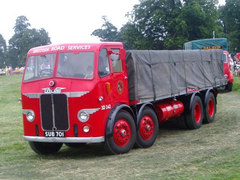

What would be a reasonable castor angle to aim for on what will be essentially a road car, I want it responsive but not super twitchy. The book quotes about 5.3 should it be abit more laid back? opinions please.
5.5 degrees is about right for caster angle these cars will never self centre particularly well due to the low weight on the front end.
You'll see im new to this but reading this forum the consensus of opinion would appear to suggest an offset on top ball joint of 22-25mm using sierra uprights, by my reckoning on a book chassis this gives castor of 7.69. however its a while since I've done any trigonometry so this could be wrong. I'm just going to work out 5.5.
Maybe I'm misunderstanding the offset measurement, is it top balljoint offset from centreline?
If my trig is right then to achieve 5.5 you need offset of 17.8mm. Hows that sound?
Most race car run about 3 -5 deg castor, road cars run anything up to 12. More castor means more self centreing. To check your calculatins are roughly correct, you can use an adjustable spirit level, or a spirit level & a protractor.
The problem is the more caster you build in the heavier the steering becomes (amongst other things). This isn't a problem with power steering but can be with manual steering and a small wheel.
You can only speak as you find.
I have a light engine, set well back.
1mm toe in, slight neg camber, and 20psi.
My first bones, to the book, didn't centralize at all.
Remade them with 22mm offset, and now the car sort of starts to centralize.
At 45mph I can take my hands off the wheel, as long as I don't hit any bumps.
I think if I made a 3rd set I'd go 25mm, but like I said, light engine, well back.
Paul G
When I looked at this I decided uncle ron had made a error in his trig resulting in 50% the caster angle he was aiming for.
He built all the caster into the top wishbone. he made the balljoint to back distance 3/4" less than balljoint to front distance. And thought his
balljoint was 3/4" forward of the centre. It isn't - it's 3/8" forward of centre.
And henceforth a generation of locosts have had trouble self centring at SVA!
I expect the problem is made worse by the huge scrub radius of the cortina uprights
cheers
Bob
More castor also means that as you turn the wheel the tires will gain more camber. Does this affect handling or anything?
Yes, obviously, it's all a compromise between driveability & max performance, for SVA I'd have plenty of castor & v.little camber,
change it around afterwards.
You have to remember that these cars are very light, so 7 or 8 degrees of castor still allows very easy steering.
My car has around 22mm of offset - it self-centres well enough, but still steers very well (VERY well!)
David
Thanks folks, the more info and opinions I can get just now the less chance there is of me making an a**e of the car and myself at a later date.
Yep steering on a Locost is never going to be heavy its is light and rear wheel drive --- in the days when men were men we drove cars weighing over 2
tons without power steering, even the largest trucks and buses only got power steering in the 1960s.
A Leyland Octopus -- power steering whats that ?
photo from http://www.daves-classic-transport.co.uk/
[Edited on 23/5/06 by britishtrident]


Rescued attachment l04.jpg